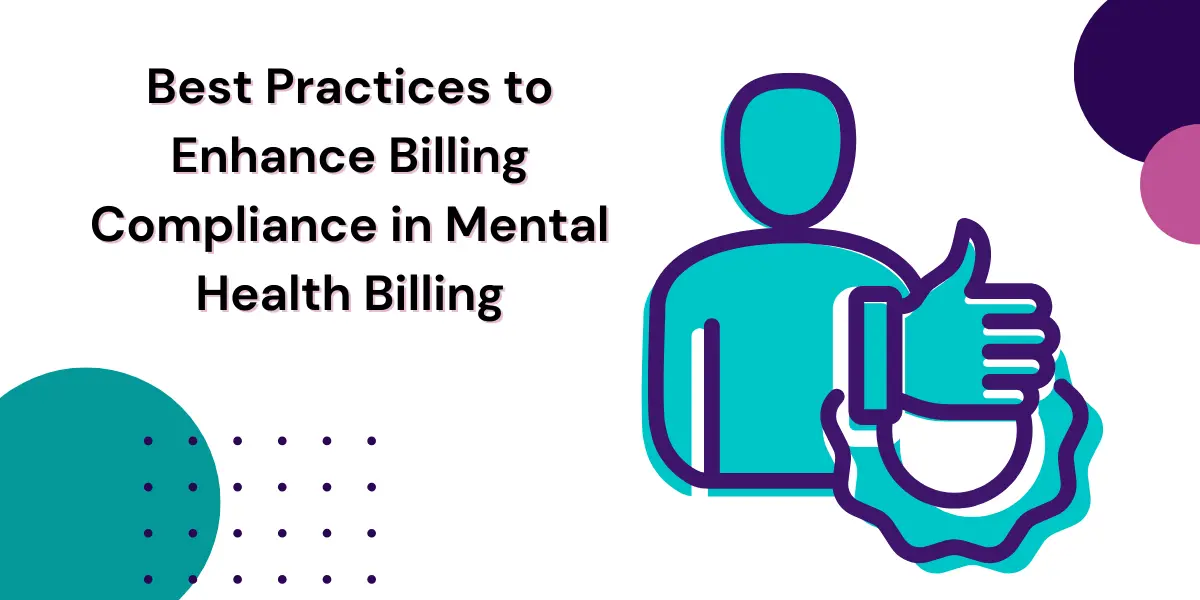Blog

The CDC estimates that more than 1 in 5 adults in the United States live with a mental illness, and 1 in 25 live with a serious mental illness, such as schizophrenia, bipolar disorder, or major depression. Mental health is a crucial aspect of overall well-being, but access to quality mental health care remains a challenge for many individuals. Billing practices play a critical role in ensuring practitioners are compensated and facilitating access for those in need. For some facilities, navigating the intricacies of mental health billing can be overwhelming, and understanding billing compliance becomes critical for both providers and patients.
What is Mental Health Billing?
Mental health billing is the process of documenting and submitting claims for reimbursement of services offered by mental health practitioners. The broad array of services includes therapy sessions, psychiatric evaluations, medication management, and more. Billing for mental health services often involves interactions with private insurance companies, government programs like Medicare and Medicaid, and direct payments from self-paid patients.
One of the primary challenges in mental health billing is the classification and coding of services provided. Mental health diagnoses are classified according to the Diagnostic and Statistical Manual of Mental Disorders (DSM-5), which provides a standardized framework for identifying and categorizing psychiatric conditions. Proper coding of diagnoses and treatment procedures is essential for accurate billing and reimbursement.

Importance of Billing Compliance in Mental Health Billing
Billing compliance in mental health care requires adhering to laws, regulations, and ethical standards that govern the entire billing process. Non-compliance can have far-reaching consequences, including financial penalties, legal repercussions, damage to professional reputation, and compromised patient care. Below are five reasons why billing compliance is of high importance in mental health billing.
1. Ethical Responsibility
Mental health practitioners have an ethical obligation to ensure transparency and integrity in their billing practices. Honest and accurate billing not only fosters trust between providers and patients but also upholds the ethical principles of beneficence and non-maleficence.
2. Legal Obligations
Failure to comply with billing regulations can result in legal consequences, including fines, civil penalties, and even criminal charges in cases of fraud or abuse. Mental health providers must stay up to date with relevant laws such as the Health Insurance Portability and Accountability Act (HIPAA), the False Claims Act, and state-specific regulations governing billing practices.
3. Financial Sustainability
Billing compliance is vital for the financial sustainability of mental health practices. Timely and accurate reimbursement ensures that practitioners can continue to provide quality care to their patients without facing undue financial strain. Also, compliance with insurance company requirements minimizes the risk of claim denials and delays in payment processing.
4. Protection Against Audit
Mental health practices are subject to audits by insurance companies, government agencies, and regulatory bodies to ensure compliance with billing standards. Maintaining meticulous documentation and adhering to billing regulations can help mitigate the risk of audit findings and associated penalties.
5. Safeguarding Patient Rights
Billing compliance is closely linked to patient rights and confidentiality. Proper handling of patient information and adherence to privacy regulations safeguard patient confidentiality and protect sensitive health data from unauthorized access or disclosure.
Challenges in Mental Health Billing Compliance
Despite its importance, achieving billing compliance in mental health care presents several challenges:
- Complex Coding Systems: The complexity of diagnostic coding systems, such as the International Classification of Diseases (ICD) and Current Procedural Terminology (CPT), can pose challenges for accurate billing. Mental health diagnoses often involve comorbidities and nuanced symptomatology, necessitating careful selection of appropriate codes.
- Insurance Reimbursement Policies: Diverse insurance reimbursement policies and coverage limitations further complicate mental health billing. Providers must navigate varying pre-authorization requirements, coverage exclusions, and reimbursement rates across different insurance plans.
- Documentation Burden: Comprehensive documentation of patient encounters is essential for billing compliance but can be time-consuming for mental health practitioners. Striking a balance between thorough documentation and efficiency in clinical practice is a perpetual challenge.
- Evolving Regulatory Landscape: The regulatory landscape governing mental health billing is subject to constant change, with updates to billing codes, reimbursement guidelines, and compliance requirements. Staying informed about regulatory changes and implementing necessary adjustments poses an ongoing challenge for providers.

Best Practices to Enhance Billing Compliance in Mental Health Billing
Despite the challenges, mental health practitioners can adopt several best practices to enhance billing compliance for mental health facilities:
- Invest in Staff Training: Comprehensive training for administrative staff on billing procedures, coding guidelines, and regulatory requirements is essential for maintaining compliance. Regular education sessions and updates can help ensure staff proficiency in billing practices.
- Implement Electronic Health Records (EHR) Systems: Utilizing EHR systems equipped with integrated billing modules streamlines documentation, coding, and claims submission processes. EHR systems also offer built-in checks for compliance with billing regulations, reducing the risk of errors and oversights.
- Conduct Regular Audits: Periodic internal audits of billing practices can help identify potential compliance issues and areas for improvement. By conducting thorough reviews of documentation, coding accuracy, and claims processing, practices can proactively address compliance concerns.
- Collaborate with Billing Experts: Seeking guidance from billing experts or consulting with professional billing services can provide valuable insights into complex billing issues and regulatory requirements. Collaborating with experts can help practices navigate billing challenges more effectively.
- Foster a Culture of Compliance: Promoting a culture of compliance within the practice reinforces the importance of ethical billing practices among staff members. Encouraging open communication, accountability, and adherence to established protocols fosters a culture where billing compliance is prioritized.
Implementing Mental Health Billing Software
Billing compliance is a cornerstone of effective mental health care delivery, ensuring transparency, financial sustainability, and adherence to regulatory standards. By prioritizing ethical billing practices, mental health practitioners can uphold the highest standards of care while safeguarding patient rights and maintaining financial viability.
Hansei’s mental health billing solutions take into account the challenges presented by billing compliance requirements – making it easier for mental health facilities to focus on the well-being of their patients and less on the paperwork. Hansei is focused on driving growth and helping mental health and addiction treatment facilities make smarter business decisions.
To learn more about mental health billing with Hansei, visit our website to book a demo.

Ready to focus on providing healthcare? Let us lighten your load.
We’re here to address your pain points and create growth opportunities for your organization. We’re passionate about what we do, and it shows in every interaction. Learn what makes us tick and schedule a demo today.